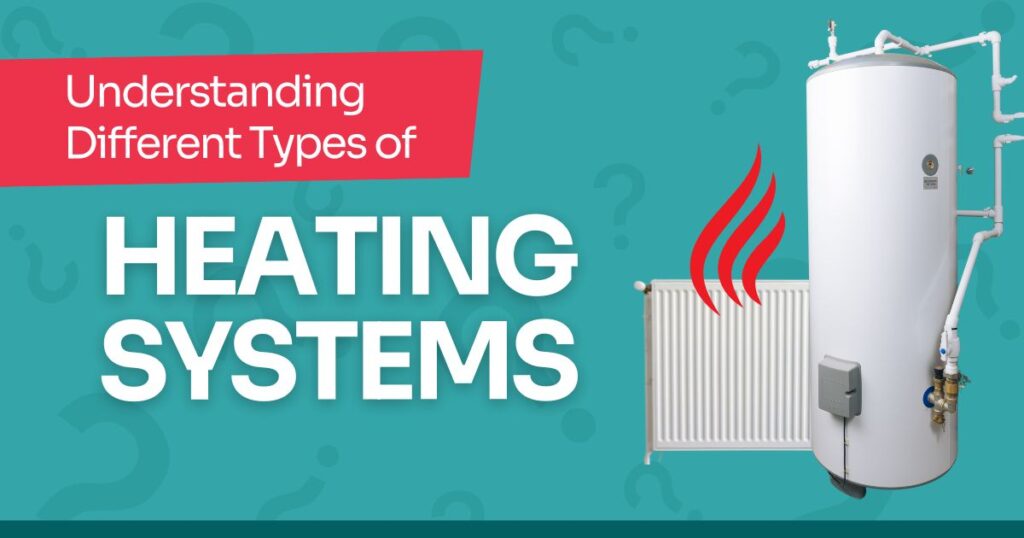
With so many heating systems on the market, it can feel overwhelming to navigate the differences. Each system varies in function, energy efficiency, and cost, and what’s right for one home might not be right for another. In this guide, we’ll explain the different types of home heating systems and offer tips to help you choose the right fit for your space.
Different Types of Heating Systems for Homes
Heating systems aren’t a one-size-fits-all situation. There are several different types available, each with unique benefits and functions. Explore the four most common types below to better understand how these units operate and determine the best heating system for your home.
Furnaces
Furnaces are one of the most common heating systems found in modern homes. While there are several types, they all operate in the same way. They draw in air, heat it using a fuel source, such as natural gas, liquid propane, oil, or electricity, and distribute it through your home via ductwork. They’re highly efficient and produce warm air almost instantly, so you never have to wait around for your home to heat up when temperatures drop.
Heat Pumps
Heat pumps are a two-in-one heating and cooling system that transfers heat between your home and the outdoors. In the winter, they extract heat from the outside air and pump it into your home, and in the summer, they reverse this process to remove heat from the air inside. There are also ground-source, geothermal, and water-source heat pumps, which pull heat from deep within the ground or from a pond or lake. While these systems have a higher upfront cost, they often help homeowners save in the long run by significantly reducing energy usage and utility bills.
Boilers
Boilers are similar to furnaces in that they use a heat source, such as electricity, natural gas, oil, or propane, to warm your home. However, rather than using this fuel source to warm air, it uses it to boil water. The water circulates throughout your home through a series of pipes, releasing heat through cast iron radiators, baseboard radiators, air handlers, or convectors. Because boilers heat water instead of air, they reduce dust circulation, offering a great alternative for those with allergies and improving the indoor air quality of your home.
Ductless Mini-Splits
Ductless mini-splits are a type of heat pump that provides heating and cooling without the need for ductwork. They typically consist of a small outdoor compressor and one or more indoor air handlers. The outdoor unit captures and releases heat from the air and circulates it to the indoor units, which heat or cool specific rooms or zones based on your needs. They’re one of the most energy-efficient heating systems as they don’t rely on ducts, which often lose energy through leaks and heat loss.

How to Choose the Right Heating System
Choosing a new heating system isn’t something to rush into. Installing a new heater impacts your comfort, energy bills, and property values, so it’s important to take time to make the right choice for your home. To get started, explore some key considerations below to help determine the right fit for your needs.
Budget
Determine how much you’re willing to spend on your initial investment. While some systems, like heat pumps and ductless mini-splits, have higher installation costs, they help you save in the long run by reducing energy usage. If you have a tighter budget, a furnace or boiler won’t require as much upfront.
Local Climate
Assess what kind of weather you deal with most of the year. If you live in an area with mild temperatures, a heat pump or ductless mini-split is an effective, energy-efficient option. On the other hand, if you’re prone to harsh winters and freezing temperatures, a boiler or furnace offers a reliable solution for cold climates.
Home Size and Layout
Consider the square footage of your house to determine how powerful of a heater you’ll need. Larger homes often require a high-capacity furnace or boiler, while smaller spaces may be fine with a single heat pump or compact furnace.
The layout of your home also affects the effectiveness of your heater. If your house has multiple stories, many rooms, or separate areas, a ductless mini-split may be your best option for zoned heating. If it’s more open-concept, installing a furnace or heat pump provides consistent heating without requiring multiple units.
Energy Efficiency
If energy costs or reducing your carbon footprint are at the forefront of your mind, consider choosing a high-efficiency option such as a heat pump or ductless mini-split. These heaters are known for their energy efficiency and can help you cut down your heating bills by as much as 30%.
If you’re still unsure which option is right for your home, contact a trusted HVAC company like Trilogy AC. They’ll guide you through your heating system options and help you find a unit that keeps your home warm and cozy for years to come.
Heating Installation Process: What to Expect
Choosing the right heating system is the hardest part of the installation process. After selecting your new unit, you can sit back and relax as a trusted HVAC technician handles the rest. Here’s what to expect when installation day arrives:
- Inspection and prep work: A technician will complete a pre-installation assessment, evaluating your ductwork, venting, and electrical connections to check if they’re compatible with your new heater. If repairs are necessary, they’ll complete them to prepare for a smooth installation process.
- Removal of the old unit: They’ll carefully disconnect and remove your existing heating system, avoiding damage to the surrounding areas.
- Installation of the new model: The technicians will then begin installing your new unit. They’ll connect it to your ductwork or piping, ensure all connections are secure, and install any necessary components.
- Cleanup and testing: After installing your new unit, they’ll clean up the area and test for proper function. They’ll check for proper airflow, thermostat function, and safety controls. Before leaving, they’ll walk you through how to use your new heater and answer any questions you may have.

Call Trilogy to Schedule Heating Installation Today!
Don’t let chilly Texas winters keep you in the cold. Call the team at Trilogy AC to schedule a heating installation today! Whether you’re interested in a furnace, heat pump, boiler, or mini-split, our experts will help you navigate your options and find the perfect fit for your home. From helping you select a system to final testing after installation, we’ll handle it all so you don’t have to worry.
Call or contact us online to schedule service in Houston or the surrounding areas today!
Frequently Asked Questions
What is the most energy-efficient home heating system?
While it varies depending on your home size, layout, and climate, heat pumps are often considered the most energy-efficient heating option. They use less energy than other systems by transferring heat from indoor or outdoor air rather than using a fuel source to generate it.
Which heating system has the lowest installation cost?
Gas or electric furnaces typically have the lowest installation cost. They’re straightforward to install, widely available, and parts are often less expensive. If your home already has existing ductwork, installation is even easier, keeping costs to a minimum.








